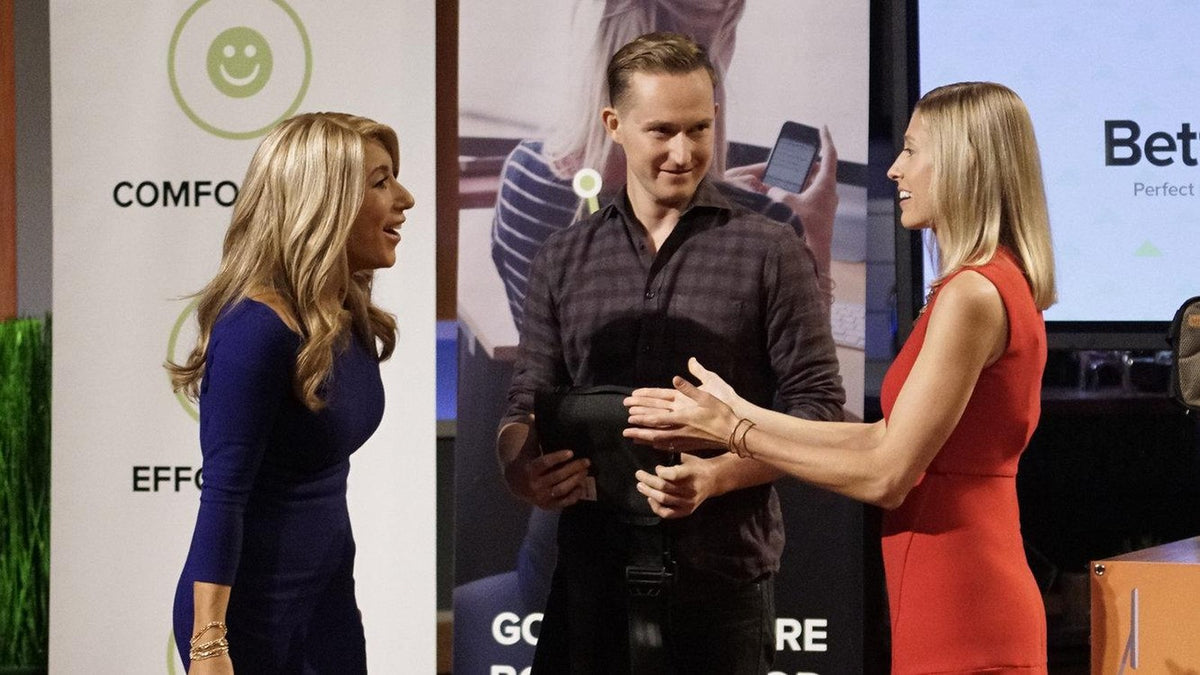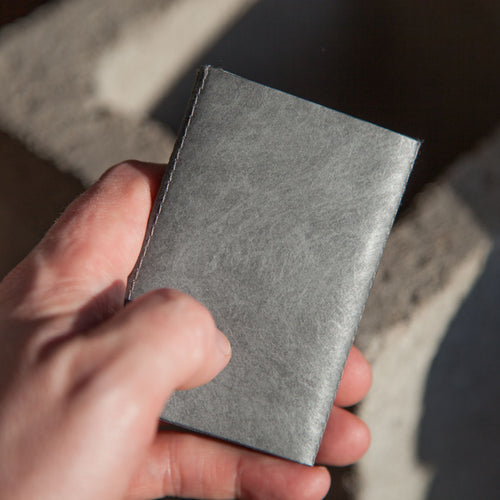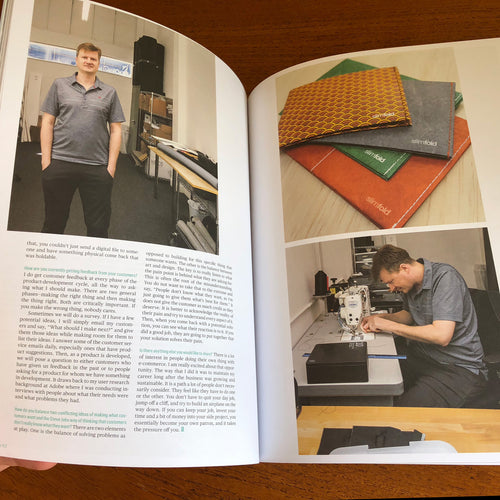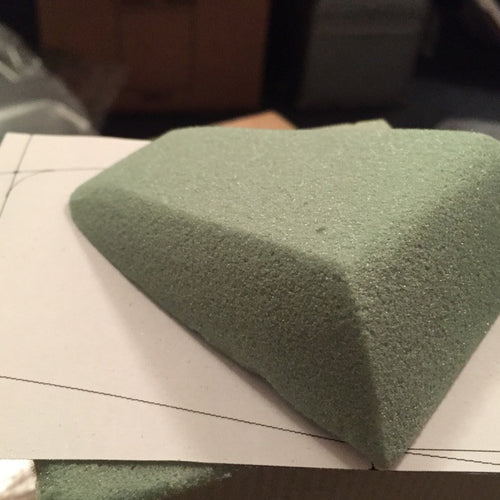Do you watch Shark Tank or maybe even dream of going on the show someday? If, in your dream, your pitch is going amazingly well, you could only hope for Lori Greiner to say…
“Guess what time it is- it’s Deal Time!”
Well, that’s exactly what happened to Katherine Krug when she appeared on the show. I recently had the chance to chat with her about her experience and she was kind enough to let me share it with you.
We talk about being the first woman to launch a $1m Kickstarter campaign (and then doing it again), what happened after the Shark Tank deal, and how the Kickstarter platform has changed over time.
How do you think I would fare in The Tank? Leave a comment and I’ll reply to each one… Enjoy!
______________________________________
Dave: Hi Katherine- thanks so much for taking the time to chat. So tell me… how did the idea for BetterBack come about?How do you think I would fare in The Tank? Leave a comment and I’ll reply to each one… Enjoy!
______________________________________
Katherine: Yeah, so I had started a technology company in San Francisco, I was your neighbor. And I was doing the normal 12-plus-hour-a-day grinds hunched in all these weird shapes over my computer. And I ended up getting just the gnarliest sciatica pain that basically meant I couldn't sit down comfortably for over a year of my life. So I was in this crazy state of trying anything I could get my hands on. Then someone sent me this very old-school product that had this really interesting pelvic stabilization strap. But it nailed my knees really, really badly after just using it even for a minute.
And so a buddy of mine was in industrial design grad school, and we're like, "Okay, check out how cool this pelvic stabilization strap is. Now how do we make this thing work?" And we jimmied up this very janky prototype that I ended up wearing actually all around San Francisco, all my meetings, any time I had to sit. And every single time I took it off and people would ask, "What is it," somebody else said, "Oh my gosh. Let me try that. I also have back pain." And it was this really interesting experience where even people I was close with every day, I didn't know we all had this common ground. We all had pain from, essentially, our technology.
And so dedicated a bunch of time and money into hiring, you know, some very experienced industrial designers and popped it on Kickstarter honestly thinking I would be able to hit my minimum orders with my manufacturer and then have this be a little side hustle on Amazon where it would help some people and it would just be a little side thing I do while I was still in technology. And then the campaign just took off. Man, it is insane. It was one of the coolest experiences of my life. We hit our campaign goal before lunchtime on the first day and I ended up becoming the first solo woman to break the million-dollar mark on Kickstarter, which was super cool.
Dave: Wow, that's awesome!
Katherine: Yeah, we've raised about $3 million through crowdfunding to date and this is our third campaign. It's really exciting.
Dave: That's fantastic. So what was the process of working with the industrial designer like? How long did that take and did you enjoy that process?
Katherine: Loved it. It was so fun. What we effectively did was I took all the things that I wanted tweaked and he had this great shop in his basement where he could churn out a prototype fast. He would send it down to me in California and then I would take my little IKEA chair out on the Embarcadero and just pull people off the streets and have them sit and try it and collected so much user feedback from this. And so basically on a weekly basis I was sending him the prototype back with a laundry list of things for us to change and tweak. And we did about six rounds of prototyping for Kickstarter, so we had over 60 beta testers wearing it, whether it's short term or on a trip from New York to New Zealand on a really long-haul flight, and the design truly was crowdsourced as well.
Dave: And how did the manufacturing go that first Kickstarter and how has that been different for you over time?
Katherine: Yeah, you know, I had had some experience manufacturing in the past but never sold product, so that was fun and a new challenge. I spent a lot of time with my manufacturers during it. We had at one point a large mutiny during it where they were trying to hold me up for a whole bunch of cash that I didn't owe them. They said they wouldn't keep working on it. We got over that. I got bedbugs from the hotel where we were at nearby where we were trying to oversee production, and it was the very high highs and low lows. But we thought we were gonna make 500 units and we got 30,000 units made and delivered on time to backers, which was really, really exciting.
Dave: Wow, sounds like a bit of personal expense in many ways.
Katherine: It always is.
Dave: Yeah. So tell me about "Shark Tank." Kind of what went into your decision to go on "Shark Tank?"
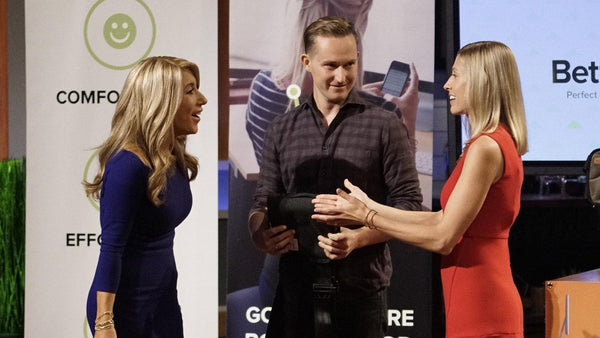

Katherine: You know, it's funny, I don't have a TV and I haven't really seen a show but every time I told people about BetterBack the first thing they said is, "Oh my gosh, you should go on 'Shark Tank.'" So there were auditions coming through San Francisco and somebody sent me the audition link. And you basically had to fill out three questions really fast and easy, and I was walking home and I was like, "Okay, I'll just do this on my phone." They accepted me and they sent me a time to show up and I said, "Nah, forget about it. I'm not really gonna go on 'Shark Tank.'" And they kept sending me reminders, reminders, reminders, and finally that morning I looked and it was only a couple blocks from my apartment. And I thought to myself, "Well, I already know my pitch. I did that Kickstarter, I did that Kickstarter video where you learn to pitch, so may as well go."
So I'm walking over and I just shoot my husband a note saying, "Hey, I'm gonna go try out for 'Shark Tank.'" And he writes, "I've got an hour free. I'm gonna come meet you." So he comes and races over, and we didn't practice at all. We do a pitch and the producer stopped us halfway through and she's like, "Wait, this is incredible. Come talk to me more." And so we didn't even have to go through a full pitch. They loved it, and every week you basically are doing just a little bit more, a little bit more, and about three months later we were down in LA filming and it was, frankly, a huge thrill. And the more I learned about "Shark Tank" the more, of course, excited I got. It was an incredible opportunity and an absolutely unique life experience.
Dave: Nice. So it sounds like it wasn't just the day of filming, it was that whole period.
Katherine: Every week. I mean, when you get down with the contracts they're making you give away your first child basically.
Dave: Oh, okay. Interesting. So what did you think when Lori said, "Guess what time it is? It's deal time."
Katherine: I was very, very excited. What you don't see on TV is actually you're standing there pitching for over an hour. My filming was over an hour and 15 minutes and there was so much back and forth and there's generally three or four sharks screaming different questions at you at the exact same time. And so you're standing in bright lights and the sharks are all there staring at you and pitching you questions. And so by the time you're getting to the phase where you're actually talking deals and numbers and not everyone's saying no it is sweet, sweet relief. Your excitement mixed with adrenaline is so great.
Dave: Very cool. So for entrepreneurs who are thinking about going on, who do you think it's good for and who would it not be good for?
Katherine: Yeah, so I think being on "Shark Tank" is great for everyone, hands down. I think something that I learned after the show when I began seeing the contract that I got and talking to others who had gotten deals with talking about their contracts is if you can raise capital from places in San Francisco, New York, Austin, Seattle… places where there are sophisticated investor markets you are going to get 1,000% more favorable terms as an entrepreneur. So the deal structure that you're going to get on "Shark Tank" is very brutal to the entrepreneur.
So knowing that, going in with eyes wide open there would be my best piece of advice. But it is absolutely fantastic for everybody, and it's the gift that keeps on giving. Every, you know, six, seven, eight weeks we re-air and you just see a huge sales spike every single time there's an airing. It's beautiful, even from a conversion rate perspective, talking about how you're a "Shark Tank" company on your website, on Facebook advertising, and Google, etc. It's absolutely worth it.
Dave: That’s great advice. And did your deal with Lori actually go through and get finalized?
Katherine: You know, we ended up not doing the deal. We still chit-chat every once in a while but we decided that we weren't actually ready to dive straight into a sale. Actually when we pitched it was just a virtual assistant and me at the company… and my husband helping too. Of course, jumping into retail is a huge undertaking and based on the terms of all the nitty gritty in the contract we realized it just wasn't right for us at the time. But as we move forward there's still a chance it could happen in the future.
Dave: Got it. Yeah, I think that's something a lot of people don't know about "Shark Tank," that the deal you say is not necessarily, like, an official deal yet. I think I've talked to five or six people who've been on and only maybe two of them actually did a deal and are working with a shark on an ongoing basis.
Katherine: Yeah, I think about 60% of the deals end up falling through on "Shark Tank."
Dave: Wow. Cool, so you've had those great previous Kickstarters and you went on "Shark Tank," and now you're on Kickstarter again. So tell me about this product and how it came to life.
Katherine: Yeah, so the new product is called SuperStraps and it instantly relieves backpack strain and improves your posture, so it's very much within the BetterBack family. The idea came to my head while I was overseeing production for BetterBack and I was carrying my backpack on the production floor. And each of the BetterBacks are very light. They're about a pound. But even having four, five, six in my backpack over the course of walking around for the day, every part of me was aching, my shoulders, my neck, my back. I was doing the thing where you're leaning forward and pulling your straps away from your body, and I just hurt.
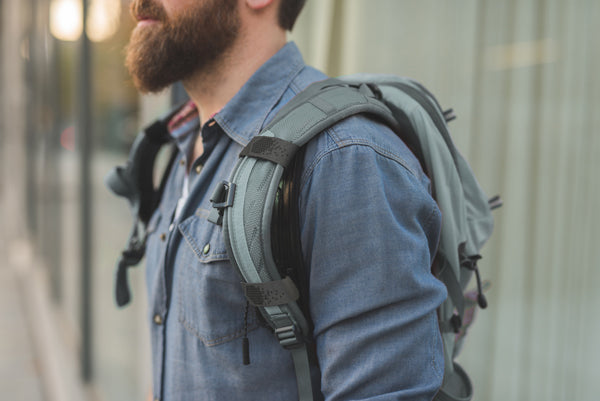
Katherine: Yeah, so the new product is called SuperStraps and it instantly relieves backpack strain and improves your posture, so it's very much within the BetterBack family. The idea came to my head while I was overseeing production for BetterBack and I was carrying my backpack on the production floor. And each of the BetterBacks are very light. They're about a pound. But even having four, five, six in my backpack over the course of walking around for the day, every part of me was aching, my shoulders, my neck, my back. I was doing the thing where you're leaning forward and pulling your straps away from your body, and I just hurt.

And I realized as I was pulling my thumbs away from my straps, and I noticed that even doing that took so much pressure off those key parts of my body, I realized we have to go make something for this that's this but even better. So we've then been working for about a year and a half to make a very simple product that the minute you activate it you feel an, "Ah." So that's kind of a design principle we're to do is when people feel an ow, how do you instantly help them feel an ah, while also building better habits that help them stay healthy long term.
So the strap attaches to your backpack strap and literally as easy as zipping and unzipping your pants it activates an arc which helps distribute the pressure that normally sits on top of your shoulders on up to five times the surface area. So it unloads your shoulders instantly, and quite interestingly it also improves your posture in the same snap. Because many of us do what we call tech neck. Have you heard of tech neck before?
Dave: I think I heard the precursor to that, which was like the Blackberry crouch or something where you're hunching over when people were doing Blackberry.
Katherine: Yeah, that's exactly right. So tech's neck has become this kind of big thing. It's the same thing, it's you're jetting your head forward to read your phone. And what's super interesting is when we have our backpacks we do the same thing. And effectively if this is my spine and my bag is sitting down here by my back, what we do is we use our head like a pendulum to counteract the weight in our bags. And as a result of that we're jetting our necks forward and even just a 15-degree head tilt is putting 27 pounds of force on your neck. So it's the equivalent of walking around with a 19-inch TV on your neck, or, like, four bowling balls. I mean, crazy numbers on your neck every day.
And so this product, not only does it distribute the force and unload your shoulders and neck but it moves the weight in your backpack closer to your spine where you can carry it ergonomically and it sort of makes this pendulum and allows you to stand and walk upright when you're wearing a backpack taking all that force off your neck.
Dave: Very cool.
Katherine: Yeah, it does a bunch of stuff. Thanks, we're so excited. I've been testing this all year and I've been actually working nomadically. We've worked in 23 countries in the last year so this has been my lifesaver with my backpack that I carry every day with me, and it really is a game changer.
Dave: Yeah, and the Kickstarter is doing great.
Katherine: Yeah, it's doing awesome.
Dave: So what do you think is the biggest contributor to how well it's done so far?
Katherine: The number one thing is getting this incredible community from our first Kickstarter and our second Kickstarter back for our third. Yeah, I was telling you just before we really crowdfunded even the design of BetterBack before we crowdfunded the financing of it with the first go-round, and we absolutely tried to keep our community together and a part of it. So we had almost 1,000 SuperStraps Ambassadors who helped us really evolve the product and were actually instrumental in what we ultimately launched. And so really bringing that community in has been the biggest contributing factor for the success. And then on Kickstarter I think we're the number three project on Kickstarter right now so we get all of the Kickstarter eyeballs, which is so helpful and great, and then just a lot of hustle.
Dave: Yeah, it's great when you can get ahead of the wave like that. So the SuperStrap Ambassadors, is that an official program that you have?
Katherine: Yeah, it was something we did pre-launch where everybody signed up to effectively get a survey a week, and we ask people for help on everything from logo design to parts of our product design, asking people questions about how they use the backpack? For what? Where? What are their pains? To make sure we're designing a product that's really gonna hit the real problem points for people that's beyond just our little, tiny team working on it.
Dave: So those were pulled from customers and then they all knew about the SuperStraps before you launched?
Katherine: Yeah.
Dave: Very cool. Great idea, and it's cool that they are able to be a part of your success as well.
Katherine: My gosh, it's so instrumental to our success. Love those guys.
Dave: So this is your third Kickstarter. What have you noticed to be the difference between them, either with the projects themselves, or your experience of doing them?
Katherine: Well, Kickstarter just did a major redesign in December, and talking to the guys over there, they're trying to become more of a publishing company as opposed to a store. So it's made it more challenging actually for project creators. And Kickstarter also isn't growing in size the way they were a couple of years ago, so there's less people coming in to enroll so it's actually getting a bit harder to do a really big, massive campaign. But at the same time for us, now that we've had two really great campaigns where we've delivered on time we have a community of backers that we didn't have when we started. And that is, I mean, they're everything to us.
Dave: And are you in any retail stores?
Katherine: No, we only sell through our website, Amazon, and crowdfunding right now.
Dave: So have you done any kind of events as well to foster your community in-person, or is that all online as well?
Katherine: Everything has been online. Yeah, we are a remote team actually. We're spread out all around the world, so there isn't sort of one central place that is our heart, if you will. Our heart is on the internet really.
Dave: That’s great. So do you find you're able to be as nomadic now as you'd ideally like to be or has the growth of the company kind of changed that at all?
Katherine: I'm in a new place every week, every week. It's been incredible.
Dave: And that's totally independent of your business responsibilities, or for the most part?
Katherine: Well, you know, before I started, I started a few companies before and they all had offices. And every time I had an office I found that I was the first one in. I would help everybody else do their jobs really well, and then it would be 8:30 at night and then I had to do all of the projects that I needed to do. And so I realized setting up this company I was very thoughtful about what kind of life I wanted to create. And I knew I wanted to help people and I knew I wanted to travel and have freedom, and I knew I also really loved being an individual contributor and not just a manager. And so I set up the company in a way that would support all of those things.
So for me, you know, people talk about work-life balance and it's not a balance, it's just the integration. I'll work 12 hours a day sitting in front of the ocean as opposed to being at an office for 8, or 9 to 10 hours. And I get great work done on airplanes, everywhere, so it hasn't held us back or slowed us down at all.
Dave: Yeah, I was interested in talking to you more about the life design principles- "Essentialism," seems to have had an influence on you, and me as well.
Katherine: Oh, it has, have you read the book?
Dave: Yeah!
Katherine: It's awesome, right?
Dave: It totally is. And I saw, you know, when we were scheduling things I saw you kind of have the Monk Mode auto-reply on your email because you have this Kickstarter project going on. I saw that right away as a way that you're putting some of those approaches into action. Are there other things you've found to be helpful?
Katherine: I'd say for the last four years I've been trying to figure out how I can be a successful entrepreneur but not burn myself out. I have always had this ethos that we haven't worked hard enough until you've worked yourself into the ground, essentially, and you shouldn't be working as if you truly can't because you're injured and so sick that you just obviously can't work.
Dave: That's your old approach, right?
Katherine: That was the old one, yeah. So I've been trying to adopt a new approach, and Cameron Herold is someone who was the COO of 1-800-GOT-JUNK. And he gave me this advice a few years ago that was you should never work more than six hours in a day, never once. And I literally thought he was bananas when I heard those words. How could you possibly only work six hours in the day? And while I still haven't gotten to that I've left that linger and I've been running an experiment for the last six or so months around relentlessly focusing on only one or two major projects and saying no to everything else in a way that it challenges the norm that's quite hard.
So for example, right now I have two main focuses. One is making this Kickstarter campaign as wildly successful as possible, and two, we're on back order for BetterBack, and so making sure we are getting out of that madness as quickly as possible, so overseeing production on that and making sure our production is smooth now so it doesn't happen again. And so it means I have to say things like, on an auto-responder, "Hey, I'm so sorry I'm not able to get back to you."
Dave: Yeah, it also seems in line, some of the approaches in "Deep Work" by Cal Newport… have you read that one?
Katherine: No, "Deep Work"?
Dave: Yep it’s in the realm of "Essentialism" ...almost like more applied "Essentialism."
Katherine: I'm gonna read that one, too, thank you.
Dave: I was also interested in the way you seem to have gotten into how you can help people achieve their goals using tools. So I'm interested to hear a little bit more about Everest and your experience with that?
Katherine: Yeah it was definitely like an external representation of who I am, and I really want to still make a business work one day that is built like Everest. So Everest was a consumer mobile app that was designed to help people set and achieve personal goals. I would say the broader philosophy is that we have all of these tools and system that we talk about that kind of bubble up and work the best, just as we just had this last conversation. And yet, in our personal lives people don't talk and share what works and what doesn't work to achieve goals, even though so many of us have common goals, right? I'm sure at least five of your friends have tried to run a half-marathon and I'm sure a couple of friends tried to quit smoking, and I'm sure a couple of friends are trying to read more this year, whatever it is.
And so we were trying to give people the tools and build a community around setting and achieving personal goals that would ultimately end up with sort of a Dream Genome which is like whatever your goal is here you are at A. And if your goal is to get to B based on all sorts of data and paths that different people have taken, what have proven to be the very best steps to get there?
Dave: I love that- Dream Genome. That is awesome.
Katherine: Yeah, but we didn't get there. It didn't work. It was the first time many of us were building a technical product and the app was super buggy, super slow, and we acquired a lot of technical debt. We had a lot of spaghetti code and so we weren't able to move quickly to improve it. Yeah, it didn't work. That doesn't mean it can't work one day.
Dave: Something I'm impressed with you about is that you're really trying to help other people ultimately with a lot of the stuff that you're doing, so that's very cool.
Katherine: Yeah, that was the most interesting thing with BetterBack. I mentioned it was supposed to be a side project and once it was successful I really had to decide, even though it's successful is this something that I really want to dedicate my time to? Because it didn't, on the surface, hit all of my goals- my whole lifestyle design is really important, and it didn't necessarily or obviously put those into play. But I look at, sort of, Maslow's hierarchy of needs and at the very base you have...of course, you have safety. And being in pain, as I know, it clouds your entire life. When you're in pain, you're in pain. You're not giving your gift to the world.
You're not improving yourself, you're not growing. And so I realized actually that helping people in this realm, it turns out, is 100% part of what I love and how I want to spend my time creating a path. So it was this sort of like left-field surprise side project to full project once that clicked for me.
You're not improving yourself, you're not growing. And so I realized actually that helping people in this realm, it turns out, is 100% part of what I love and how I want to spend my time creating a path. So it was this sort of like left-field surprise side project to full project once that clicked for me.
Dave: That's fantastic. Well, congratulations on your success.
Katherine: Thank you so much.
Dave: I wish you luck in the rest of your Kickstarter campaign.
Katherine: Thank you so much. We've got about 30 days and we're gonna get to $1 million. Whatever it takes we're gonna get to $1 million.
Dave: I believe you will.

